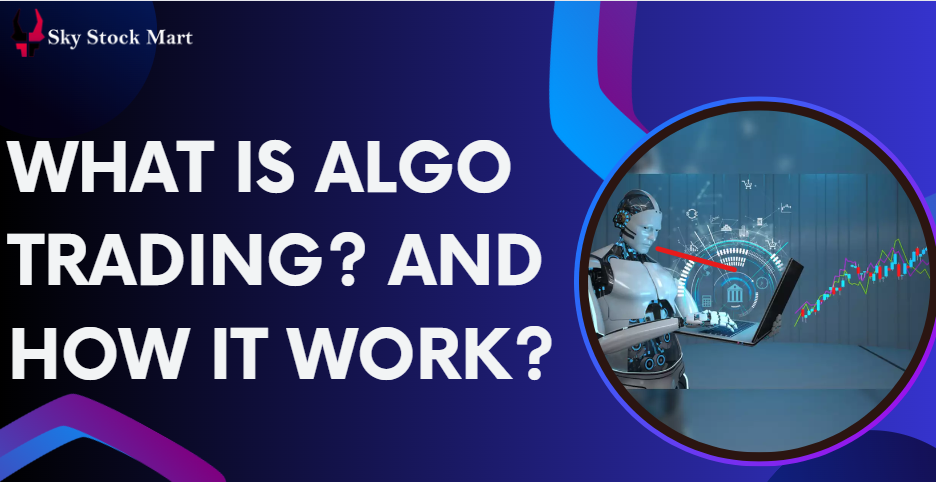Demystifying Algorithmic Trading: A Comprehensive Guide
Introduction
What is Algo Trading? And How it Work?
What is Algo Trading? And How it Work? Algorithmic trading, often referred to as algo trading, has become a buzzword in financial markets. As technology continues to advance, traditional methods of trading are making way for more sophisticated and automated approaches. In this blog post, we will delve into the world of algorithmic trading, exploring what it is, how it works, and its impact on financial markets.
What is Algorithmic Trading?
Algorithmic trading is a method of executing financial transactions using pre-programmed algorithms or computer-generated instructions. These algorithms are designed to analyze market data, identify trading opportunities, and execute orders at high speeds. What is Algo Trading? And How it Work? The primary goal of algo trading is to optimize trading strategies and achieve better outcomes in terms of speed, accuracy, and efficiency compared to manual trading.
How Does Algorithmic Trading Work?
- Data Analysis and Strategy Formulation:
- Algo trading begins with the development of a trading strategy. What is Algo Trading? And How it Work? Traders use historical market data to identify patterns, trends, and potential opportunities.
- Various mathematical models and statistical techniques are employed to analyze the data and formulate trading algorithms.
- Coding and Implementation:
- Once a trading strategy is developed, it is translated into computer code. What is Algo Trading? And How it Work? Programming languages like Python, Java, and C++ are commonly used for this purpose.
- The algorithm includes instructions on when to buy or sell, the quantity to trade, and risk management parameters.
- Connectivity to Market Data Feeds:
- Algo traders need access to real-time market data to make informed decisions. They connect their algorithms to market data feeds provided by exchanges or data vendors.
- Order Routing:
- When a trading signal is generated by the algorithm, orders are automatically routed to the market. The speed of execution is crucial in algo trading, and these systems can execute trades in a fraction of a second.
- Risk Management:
- Algo trading systems incorporate risk management mechanisms to control potential losses. This may include setting stop-loss orders, position sizing rules, and other risk mitigation strategies.
- Monitoring and Optimization:
- Algorithms are continuously monitored for performance. What is Algo Trading? And How it Work? Traders may refine and optimize algorithms based on changing market conditions or to improve overall profitability.

Advantages of Algorithmic Trading
- Speed:
- Algo trading operates at speeds impossible for human traders. This allows for quicker response to market changes and the exploitation of short-lived opportunities.
- Accuracy:
- Algorithms execute trades with precision, reducing the likelihood of human errors in trading.
- Efficiency:
- Automation allows for 24/7 trading without the need for constant human supervision.
- Backtesting:
- Traders can backtest algorithms using historical data to assess their performance before deploying them in live markets.
- Diversification:
- Algo trading enables the execution of a large number of trades across different assets simultaneously, facilitating diversification.
Challenges and Considerations
- Technical Complexity:
- Developing and maintaining algorithmic trading systems requires a high level of technical expertise.
- Market Risks:
- Algo trading is not immune to market risks, and poorly designed algorithms can result in significant financial losses.
- Regulatory Compliance:
- Traders using algorithmic strategies must adhere to regulatory guidelines to ensure fair and transparent market practices.
What is the Meaning of Lots in stock market ?
अपनी बेटी के विकास के लिए इन्वेस्टमेंट करे – SIP म्यूच्यूअल फण्ड में
अपनी बेटी के विकास के लिए इन्वेस्टमेंट करे – SIP म्यूच्यूअल फण्ड में
સ્ટોક માર્કેટમાં પાર્ટ ટાઇમ જોબ કેવી રીતે મેળવવી
Conclusion
Algorithmic trading has revolutionized the landscape of financial markets, bringing efficiency and speed to the forefront. As technology continues to evolve, the role of algo trading is likely to expand, influencing how financial markets operate.What is Algo Trading? And How it Work? However, it is crucial for traders and investors to understand the complexities and risks associated with algorithmic trading and approach it with careful consideration and expertise.


